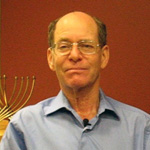By Stanley Tiger

SAN DIEGO — The following is a touching story about two great minds – one, a Jewish atheist respectfully confronting a religious Jew. Their reflections are in keeping with the solemnity of Rosh Hashana.
The old friends and collaborators unexpectedly met while in Washington, D.C.. Nobel physicist, Richard Feynman (1918 – 1988) is famously known for reporting the cause of the Space Shuttle Challenger disaster (and his constant mention on The Big Bang Theory). The prolific Pulitzer novelist, Herman Wouk, is famous for The Caine Mutiny (at age 103, he just purchased a smaller home). They had previously spent many hours together hiking in Aspen and in consultation for another of Wouk’s renowned novels, War and Remembrance.
Feynman, who had already done most of the talking, was unsympathetic to religious belief – since the age of ten. He described the Bible as “childish fables.”
“Core of my life,” responds Wouk, explaining that they have more similarities than differences, starting with Talmudist grandfathers from Minsk who had contributed to their inherited interest in following long strings of logic and their mutual joy of striking upon unflawed truth.
“I don’t believe any of it,” exclaims the originator of Feynman diagrams, a tool to explain subatomic physics.
Wouk continues with how he values Jewish heritage for its dissemination of reason throughout history. Being so few in numbers, he comments, those who adhere to the traditions, “keep the flame.”
“And how do you handle science and religion?” asks the Laureate physicist, suggesting that the Pulitzer novelist must be compartmentalizing to shut out the many differences between the two realms.
Wouk then surprises Feynman with his knowledge of scientific history, referring to Darwin and Steven Weinberg, another prominent Nobel physicist of the Jewish atheist persuasion. “In earlier times,” Wouk explains, “religion was moral philosophy” and “science was natural philosophy.” Enlightened men and women were at home with both.
Bringing the argument closer to Feynman, Wouk then invokes John Wheeler, coiner of the term, “black hole” and Feynman’s personally revered doctoral mentor, who “obliquely hints that the universe may require an Observer to exist at all.”
With Feynman’s interest piqued, the novelist explains his understanding that science and religion are one realm, not two, and that their views are closer than what Feynman may think. Introducing the Talmudic manner of handling disputes when neither side can agree, Wouk, a student of Talmud, explains the Aramaic expression, “teiku!”, the declaration of a tie or draw, when logic on both sides is equally balanced – a term used today in Israeli soccer.
Wouk then refers to a television program with an often-quoted response to an interview where Feynman admits to his childlike wonderment of nature. Although the physicist tries to distance himself from his ad-lib, he stands by it. Continuing, Wouk talks of the enduring wonder that powers Feynman’s science, it also powers Feynman’s despised philosophy, rejected religion and all poetry and art.
Entering yet deeper into the disputed territory, Wouk quotes Ecclesiastes, “He has made all things beautiful in their time, and has put eternity in men’s hearts …” Feynman appreciates the sentiment, but is still remains unimpressed.
Wouk goes in for the match point, “Can I ask you something?”
“Sure. Anything.”
“How do you handle sorrow?”
Feynman is stopped cold, stricken, haunted, silent – a man who had had his share of sorrow – he responds, “How do you handle it?”
“I can’t. He helps. Helps to heal.”
The intransigent atheist stares at the Talmudist, then, with a friendly punch in the arm, Feynman smiles and says, “Almost, I envy you.”
Pressured to catch an appointment, Feynman looks at his watch, adding, “I’ve enjoyed myself.” They shake hands, go their ways until Feynman looks back and with a laugh, calls out “Teiku!”
Chag Sameach. May your joys far exceed your sorrows this 5779.
*
Stanley Tiger is completing a book on science and religion. The above was adapted from Herman Wouk’s, “The Language God Talks.”